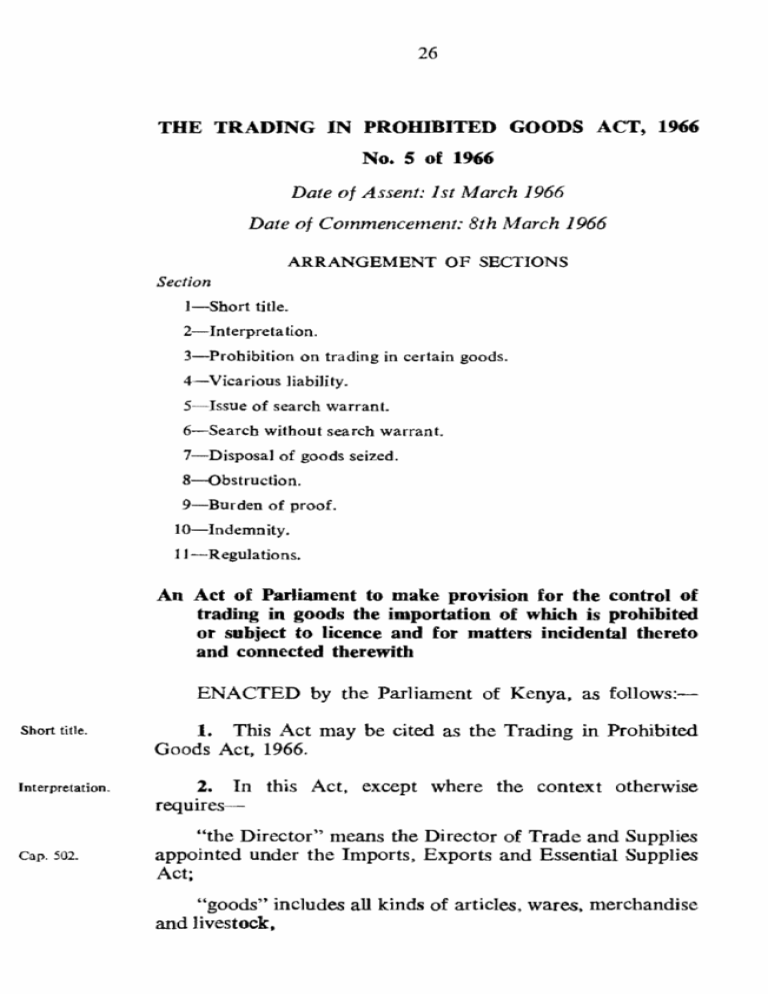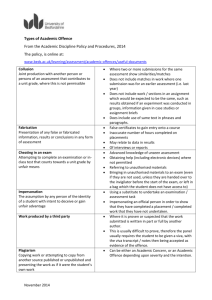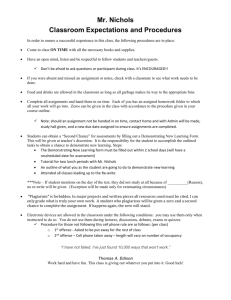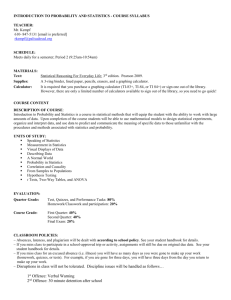26 Date of Assent: 1st March 1966 Date of Commencement: 8th
advertisement

26 THE TRADING IN PROHIBITED GOODS ACT, 1966 No.5 of 1966 Date of Assent: 1st March 1966 Date of Commencement: 8th March 1966 ARRANGEMENT OF SECTIONS Section I-Short title. 2-In terpreta lion. 3-Probibition on trading in certain goods. 4-Vicarious liability. 5-Issue of search warrant. 6-Searcb without search warrant. 7-DisposaJ of goods seized. 8-Dbstruction. 9-Burden of proof. to-Indemnity. 1J-Regulations. An Act of Parliament to make provision for the control of trading in goods the importation of which is prohibited or subject to licence and for matters incidental thereto and connected therewith ENACTED by the Parliament of Kenya. as follows:Short title. 1. This Act may be cited as the Trading in Prohibited Goods Act. 1966. Interpretation. 2. In this Act, except where the context otherwise requires- Cap. 502. "the Director" means the Director of Trade and Supplies appointed under the Imports. Exports and Essential Supplies Act; "goods" includes all kinds of articles. wares. merchandise and livestock, 27 1966 No.5 Trading in Prohibited Goods "to trade" means to sell or to expose or offer for sale goods for the purpose of profit, or to transfer possession of goods in the giving of services for profit. 3. (I) No person shall trade in or have in his possession for the purposes of trade any goods which are the subject of. or are substantially of the same description as goods which are the subject of. an Order under the East African Customs Management Act of the High Commission prohibiting the importation thereof into Kenya. whether or not such goods were imported prior to the coming into operation of such Order: Provided that in the case of goods in respect of which such an Order is made after the commencement of this Act, the provisions of this subsection shall not apply until six months have elapsed after the coming into operation of such Order. (2) No person shall trade in or have in his possession for the purposes of trade any goods which are the subject of an Order under the Imports, Exports and Essential Supplies Act prohibiting the importation thereof into Kenya without an import licence, unless such goods have been imported into Kenya under and in accordance with the provisions of an import licence issued by the Director: Provided that where the Director by writing under his hand certifies that no import licence for such goods has been issued during the twelve months' period immediately prior to the date of any purported breach of the provisions of this subsection. it shall be presumed by any court inquiring into such breach that the goods in respect of which the breach is pu rported to have been committed were not imported into Kenya under and in accordance with the provisions of an import I icence issued by the Director. (3) Any person who contravenes or fails to comply with the provisions of this section shall be guilty of an offence and shall be liable to imprisonment for a period not exceeding six months or to a fine not exceeding five thousand shillings or to both such imprisonment and fine. and in addition to or in lieu of any other penalty imposed the magistrate convicting any person for an offence under this section shall order any goods in respect of which such offence was committed to be forfeited and disposed of as he thinks fit. Prohibition on trading in certain goods. 12 of 1952. Cap. 502. 28 No.5 Trading in Prohibited Goods 1966 Vicarious liability. 4. Where any act or thing done or omitted to be done by any agent, derk or servant employed by the legal owner, or the person who holds himself out to be the legal owner of goods, which. if done by such owner or person himself, would constitute an offence under this Act, such owner or person shall, and without prejudice to the liability of such agent. clerk or servant, be liable for such offence as if the act or thing had been done or omitted to be done by him. Issue of search warrant. 5. Where a magistrate is satisfied by information on oath that there are reasonable grounds for suspecting that an offence has been or is being committed under this Act or that evidence of the commission of such an offence is to be found on any premises specified in the information. he may issue a search warrant authorizing any police officer to enter such premises at any time wi thin one month from the date of such warrant, to search such premises, and to seize any thing found thereon which the person so authorized has reasonable grounds for believing to be evidence of the commission of such offence as aforesaid. Search without search warrant. 6. Any police officer of or above the rank of Inspector, if he has reasonable cause to believe that any offence under this Act has been or is being committed on any premises, or if he has reasonable cause to believe that evidence of the commission of such an offence is to be found upon any premises and that the delay which would occur in obtaining a search warrant as hereinbefore provided would, or would tend to, defeat the purposes of this Act, may enter and search such premises without a search warrant for the purpose of ascertaining if such an offence has been or is being committed or whether or not evidence of the commission of such an offence is in or upon such premises, and may inspect any goods and any documents relating to them, and may seize any such goods or documents on such premises which the person so searching or inspecting has reasonable cause to believe to be evidence of the commission of such an offence: Provided that(i) before exercising the powers conferred by this section the police officer concerned shall first record in writing the grounds of his belief and such description as is available to him of the thing or things for which search is to be made; and 29 1966 No.5 Trading in Prohibited Goods (ii) the police officer shall carry with him and produce to the occupier of the premises on request by him his certificate of appointment; and (iii) the provisions of the Criminal Procedure Code as to searches shall apply to a search without warrant under this section except where otherwise provided under this Act. Cap. 75. 7. Where any goods have been seized under section 5 or section 6 of this Act. the person who has seized such goods shall forthwith report to a magistrate the fact of such seizure and the magistrate shall make such order as to the return, retention or disposal of such goods as he thinks fit. Disposal of goods seized. 8. An y person who obstructs or hinders any officer lawfully exercising any powers. duties or functions under this Act shall be guilty of an offence and shall be liable to imprisonment for a period not exceeding six months or to a fine not exceeding five thousand shillings or to both such imprisonment and fine. Obstruction. 9. In any proceedings under this Act, the onus of proving the place of origin of any goods shall lie upon the person prosecuted or claiming anything seized under this Act; and, if in any such proceedings any question arises as to the lawfulness or otherwise of the importation of any goods, then the onus of proving the circumstances of such importation shall lie upon such person. Burden of proof. 10. Where any proceedings are brought against any officer of the Government on account of any act done. whether by way of seizure of any goods or otherwise. in the execution or intended execution of his powers or duties under this Act and judgment is given against such officer. then, if the court before which such proceedings are heard is satisfied that there were reasonable grounds for such act, the plaintiff shall be entitled to recover anything seized or the value thereof. but shall not otherwise be entitled to any damages and no costs shall be awarded to either party. Indemnity. 11. The Minister may make regulations for the better carrying out of the provisions of this Act. Regulations .






